Villains
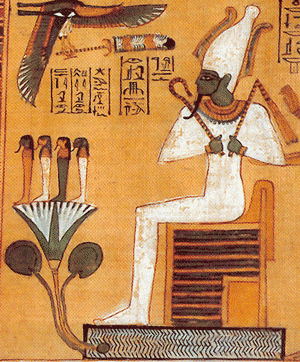
What binds a group of ancient evil beings together? Not some grand principle of villainy. Evil is just extreme selfishness. But hatred can go a long way. The enemy of my enemy is my friend. So who from the ancient world has suffered the most? Might it be the old gods? Or those who worship them? Who offers sacrifice anymore to Osiris? Who fears the shadow of Anubis as they step from this world into the next? Who believes the beetle god Khepri drags the sun across the sky behind him? No one. And those that remember the glory days are pissed off. So who's been lurking around since the time of the pharaohs?
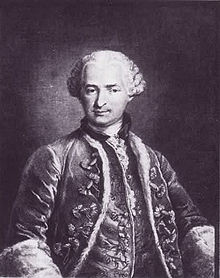 The Comte de St. Germain has, or so he told everyone in the court of Louis XV. Apparently, at the very least, he is party to the secret magics of Osiris, Son of the Earth, King of the Dead. The elixir of Osiris is said to prevent death. And so the comte, which is but one of his many names, has been lurking about for some time. But the old magics are not what they once were. Their power has diminished with their gods. So he whispers in the ears of kings, pulling on what strings he can, seeking allies where he can find them.
And old gods may fade, but as long as a single soul still believes, they never die.
Even the ancient blood gods and their vampire acolytes. Born in ancient forests of the north where men offered midnight blood sacrifice. Of their king, their Ancient Master, raised from the dead a hundred centuries past, nothing remains but pure fury. Hatred for the burning sun, hatred for his mortal prey, hatred for the new world of foul brick and lifeless steel.
But in hatred, perhaps, there is common cause.
The Comte de St. Germain has, or so he told everyone in the court of Louis XV. Apparently, at the very least, he is party to the secret magics of Osiris, Son of the Earth, King of the Dead. The elixir of Osiris is said to prevent death. And so the comte, which is but one of his many names, has been lurking about for some time. But the old magics are not what they once were. Their power has diminished with their gods. So he whispers in the ears of kings, pulling on what strings he can, seeking allies where he can find them.
And old gods may fade, but as long as a single soul still believes, they never die.
Even the ancient blood gods and their vampire acolytes. Born in ancient forests of the north where men offered midnight blood sacrifice. Of their king, their Ancient Master, raised from the dead a hundred centuries past, nothing remains but pure fury. Hatred for the burning sun, hatred for his mortal prey, hatred for the new world of foul brick and lifeless steel.
But in hatred, perhaps, there is common cause.
The Artifact
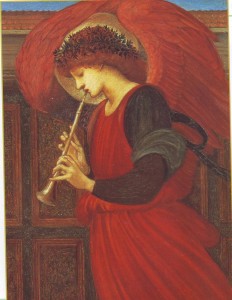
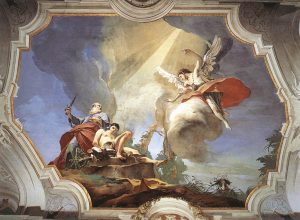 Clearly, the physical goal of our baddies had to be something really big. Something useful to them in their plots. The fall of antiquity was not about barbarians at the gates of Rome. No. The rising tide of monotheism was what really swept away the old order.
So it is against God that our villains lash out.
Clearly, the physical goal of our baddies had to be something really big. Something useful to them in their plots. The fall of antiquity was not about barbarians at the gates of Rome. No. The rising tide of monotheism was what really swept away the old order.
So it is against God that our villains lash out. And I found the perfect legend in the most unlikely of places. I was passing the time during Yom Kippur services by reading the story of Abraham offering Isaac for sacrifice (Genesis 22).
This has always been a passage of particular interest to me, dealing as it does with the nature of the relationship between man and God and the meaning of ritual sacrifice. But it was in the commentary that I noticed something peculiar, a cryptic remark that "the Ram in the Thicket is but one of ten special things created by God on the eve of creation." How's that for a magic seeker's wet dream. Back at home I dug into this and discovered that on the eve of the first Sabbath, before the creation of world, God created ten special things (which besides the Ram include the rainbow of Noah, the staff of Moses, and other goodies). These items are eternal, having existed before the universe, they have no temporal beginning or end. God, it seemed, placed the Ram into the trust of the Archangel Gabriel, who kept it in the Garden of Eden until Abraham needed it at Mount Moriah. Afterward, nothing of the Ram was wasted. Gabriel took the horns and brought one to Moses so that he could sound the arrival of the Ten Commandments at Mount Sinai. The other was kept by the archangel, hidden in the Garden, so that at the appointed time it might be brought to Elijah to sound the End of Days. This notion of a horn blast sounding the end of the world is a highly persistent meme. It's found not just in the Jewish traditions regarding the Messiah, but in the Revelations of John where seven angels (including presumably, Gabriel) sound the end of time and the Last Judgment. And also in diverse mythologies such as the Norse, where the Gjallarhorn shall announce the onset of Ragnarök. In the world of The Darkening Dream, all beliefs are simultaneously true, as brought forth and conceived by their believers. This means that anything as consistent as the horn legend is doubly true. Archetypal truth made manifest. And what of Gabriel's Horn? Eternity is a long time and the archangel flits hither and yon. Might not a busy seraph misplace such a thing... if only for a short time?
The Myriad Layers of the Esoteric World
How to properly envision a world in which vampires, the Archangel Gabriel, witchcraft, and Egyptian gods all exist? Many might just toss them together arbitrarily, but I wanted to find a framework consistent with traditional mysticism. Having read hundreds of religious and magical texts I have identified numerousconsistencies in the thought patterns of the esoteric mind.
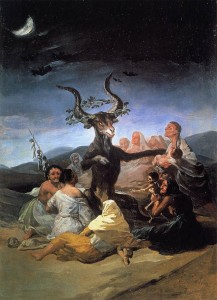
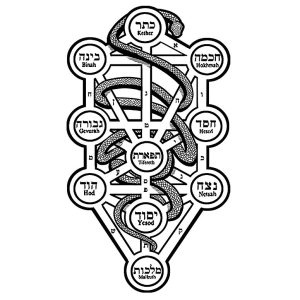 By way of example, let's place ourselves in the mind of my protagonist Sarah's father Joseph. As a Rabbi, scholar, and mystic Joseph draws his world view from the Zohar and other great texts of the Kabbalah. In this conceptualization, which can be summed up as "hidden and not revealed," the world is a many layered thing, like an onion, with the portion we perceive merely the lowest of ten modalities, all simultaneously overlaid. The pure conceptualization of God pervades everything, and is the highest. Yet the human mind can not fully comprehend this level of divine and celestial purity. In between are various layers that express important truths like "Beauty" and "Wisdom."
By way of example, let's place ourselves in the mind of my protagonist Sarah's father Joseph. As a Rabbi, scholar, and mystic Joseph draws his world view from the Zohar and other great texts of the Kabbalah. In this conceptualization, which can be summed up as "hidden and not revealed," the world is a many layered thing, like an onion, with the portion we perceive merely the lowest of ten modalities, all simultaneously overlaid. The pure conceptualization of God pervades everything, and is the highest. Yet the human mind can not fully comprehend this level of divine and celestial purity. In between are various layers that express important truths like "Beauty" and "Wisdom." In Joseph's orthodox world, God is all powerful, so powerful that even the Archangel Gabriel is but a manifestation of His Strength. The angel is not an independent entity, but a protrusion of God's will into these middle layers of reality. Joseph might actually see the angel, but in his mind, this is just his perception of an aspect of God leaking into the mortal layers. The human mind cannot comprehend the divine, so God softens the blow with the angelic form. As hard as this might be to get your head around, it seemed reasonable to extend this kind of framework to many forms of magic in the book. The villainous Puritan warlock, Pastor John Parris, works a school of traditional witchcraft, yet it too is based on layered perception of reality. For him, the magical realm is twisted into a less spacial form, with objects and people adjacent not just by physical proximity, but by the likeness of their form and nature. So, a person's hair, separated as it might be from their body, provides magical access to the owner. Likewise, his religious conceptualization allows for the layering of hell dimensions, separated by flame. With the help of his succubus lover he is able to step through these fiery gateways and bend the rules of time and space. While occasionally, as is the case with the Horn, the mythological drives the story, most often the structural needs of my plot demanded esoteric action. I therefore required interoperability between diverse magic systems in order to make the action work. For example, when Joseph wishes to protect his home from the intrusions of the evil Parris and the ancient vampire al-Nasir, he prays to invoke the archangels and align the physical rectangle of his house with the metaphysical form of King Solomon's Temple. For him this is an act of faith drawing on protective aspects of God's divinity. But Parris too is able to perceive this change in the nature of reality, albeit in his own terms. His plans to gain entry requires the construction of an elaborate ritual analog. Like a voodoo doll for a building. Just as the limbs of the doll can be broken, the metaphysical walls of the temple may be breached.
Succubus from the source
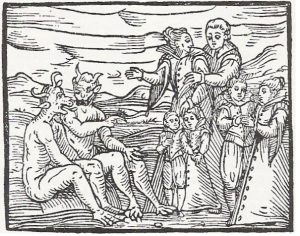 For each of my supernatural beings I strove to draw upon classical source materials rather than rely on 20th century pop culture. My warlock, Pastor Parris, is a man of repressed passion based on serial killer profiles. His only emotional connection to the outside world has been through a series of dominating female figures. First his puritanical grandmother, then following her grisly demise, his succubus lover Betty. Like all magic in the world of The Darkening Dream, Betty is a conceptual product of her beholder. So I turned to The Malleus Maleficarum, the rantings of two 15th century clergymen, Heinrich Kramer and James Sprenger. This book, which translates as the The Witch Hammer, was used by the Inquisition as a handbook for identifying and persecuting witches and demons.
Along with a five page essay on the mechanism by which Succubi and Incubi transfer semen, the Maleficarum has this to say about Succubi:
For each of my supernatural beings I strove to draw upon classical source materials rather than rely on 20th century pop culture. My warlock, Pastor Parris, is a man of repressed passion based on serial killer profiles. His only emotional connection to the outside world has been through a series of dominating female figures. First his puritanical grandmother, then following her grisly demise, his succubus lover Betty. Like all magic in the world of The Darkening Dream, Betty is a conceptual product of her beholder. So I turned to The Malleus Maleficarum, the rantings of two 15th century clergymen, Heinrich Kramer and James Sprenger. This book, which translates as the The Witch Hammer, was used by the Inquisition as a handbook for identifying and persecuting witches and demons.
Along with a five page essay on the mechanism by which Succubi and Incubi transfer semen, the Maleficarum has this to say about Succubi:
Devils have no lungs or tongue, though they can show the latter, as well as teeth and lips, artificially made according to the condition of their body; therefore they cannot truly and properly speak. But since they have understanding, and when they wish to express their meaning, then, by some disturbance of the air included in their assumed body, not of air breathed in and out as in the case of men, they produce, not voices, but sounds which have some likeness to voices, and send them articulately through the outside air to the ears of the hearer.
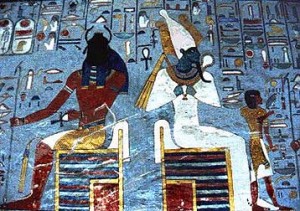 From this passage, we know that one of the means of identifying Succubi is that they do not move their lips when speaking, but manipulate the elements of fluid air near their mouths directly. Hence, in my novel, Betty does not open her mouth to speak, but the air in front of her shimmers as she does. In keeping with my fast paced action oriented novel, I never make an issue of this, but like thousands of other details in the book it is informed by the source. Clearly brothers Kramer and Sprenger knew what they were talking about, as they inspired thousands to burn at the stake.
From this passage, we know that one of the means of identifying Succubi is that they do not move their lips when speaking, but manipulate the elements of fluid air near their mouths directly. Hence, in my novel, Betty does not open her mouth to speak, but the air in front of her shimmers as she does. In keeping with my fast paced action oriented novel, I never make an issue of this, but like thousands of other details in the book it is informed by the source. Clearly brothers Kramer and Sprenger knew what they were talking about, as they inspired thousands to burn at the stake.
The Power of the Word
With each different school of magic I tried to extract the historic flavor and mindset of past occultists. The mysterious Khepri, another of my villains, practices an ancient Egyptian magic entirely different from Parris' devilish thaumaturgy. The spirit of Egyptian magic often derives from the use of secret names and the spoken word — nay command. The sorcerer/priest orders, by way of his secret magic, the very gods and demons to do his bidding. So it is that when Khepri invokes the miniature sun which is his weapon, he cries these words from The Egyptian Book of the Dead:Re sits in his Abode of Millions of Years. The doors of the sky are opened for me, the doors of the earth are opened for me, the door-bolts of Geb are opened for me, the shutters of the sky-windows are thrown open for me. I know you, I know your names; Release him, loose him!By sheer force of his sorcerous will he demands the sun yield to him. And so it does.







0 comments:
Post a Comment